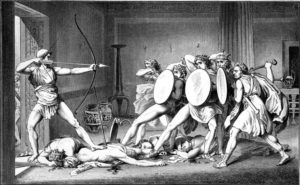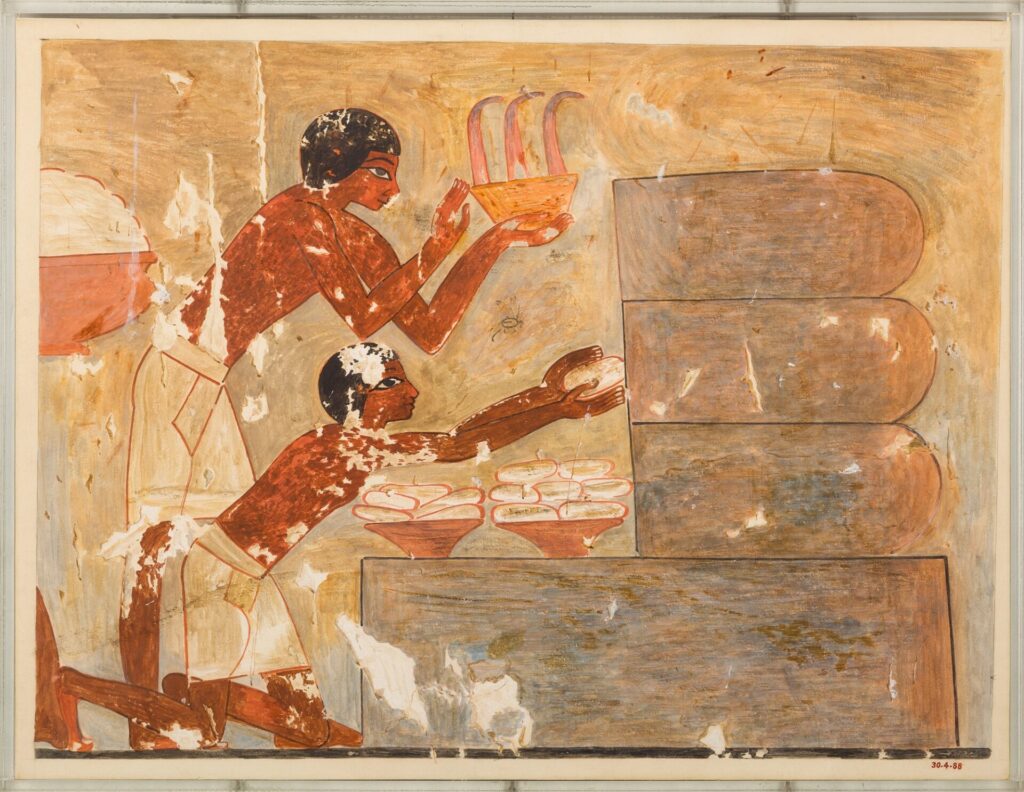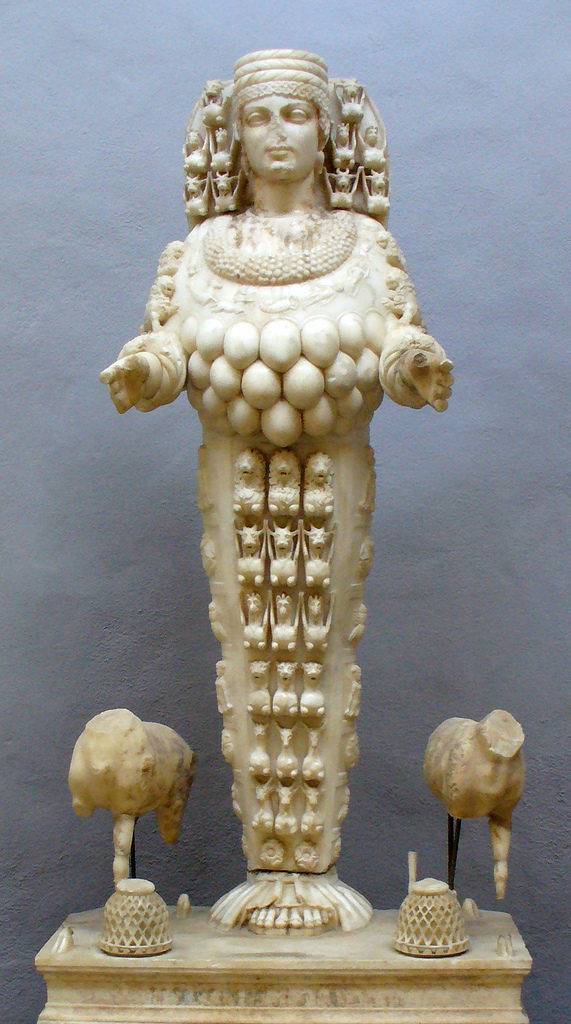The eclipse as a dating device.
The experience of studying ancient history at any level is to deal with dates as amorphous and ranging. Even where we can assign a year to an event the idea that you can whittle this down to a specific date and, shock horror, an hour makes the hairs on the neck bristle.
Yet this option is offered in the case of an eclipse. These aren’t arbitrary events, they obey strict rules and and can be calculated both going forward and in the mists of time. The extra detail you have with an eclipse is that, depending on where you are, the experience of one will be different. In a podcast on this topic (and the episode notes) I linked in with how this works.
In short provided we have a decent account of roughly when an eclipse was and how it was experienced (e.g. a full eclipse) we can also add in a new detail – where the observer was at the time. This then provides both a date (to the minute) but also a sort of GPS. Fortunately NASA has a site which records in depth both lunar and solar eclipses of antiquity.
Using this, and supporting arguments which I have linked to we can add days, minutes, seconds into our experience of antiquity. Though with a couple of the examples there is still room for speculation and debate.
(all dates BC unless indicated otherwise)
Solar Eclipses.
May 3rd 1375 or 5th March 1223 – Ugarit.
In this instance the excellent record keeping of the Mesopotamians gives us two possibilities. What causes the dispute is that the clay tablet recording the event mentions the planet Mars (read here) and this fits more snug to the date in 1223.
6th June 1218 – Troy, death of Patroclus.
As with anything related to Troy there is a tendency to want to believe which overtakes the facts in hand. But this is still fascinating stuff.
In a paper published in Mediterranean Archaeology and Archaometry a group of scholars argued that an eclipse occurred on the same day that Patroclus died at Troy. Book 17 features a passage (366ff) in which the two armies fight over the body of Patroclus in darkness as there was ‘neither sun nor moon’.
Using high tech software the scholars made the case that the path of the eclipse would have been over Troy and in the later afternoon; in short a possible candidate. Going further (and echoing a point made in the instance above) they were able to cite other celestial activity (in this case the position of Venus mentioned in Bk 23 226-228) as evidence.
Going one step further they even argued that the final scene as depicted on the famous Shield of Achilles was in fact a skymap of the date when Patroclus died. This date differs from the one the Nasa site has allocated for the eclipse (16th April 1177) and the reason for this is contained in the next entry.
30th October 1207 – Ithaca, the death of the suitors in the Odyssey.
The same team then found another eclipse, this one some 10 years or so after the death of Patroclus which was toward the end of the Trojan War. Assuming your disbelief is still outside the door then you could look to tie in this eclipse with something at the end of the Odyssey, as it took Odysseus 10 years to make it back home. In fairness it’s all outlined in this paper.
The team found a’ solar event in Bk 20 of the Odyssey (line 356) just prior to the death of the suitors. If you think this is a niche argument you might be wrong, another team argued for a rival date of 16th April 1178 . As with the first paper it’s quite detailed and certainly worth a read.

15th June 763. Northern Assyria.
Possibly one of the most eventful records of an eclipse for reasons I’ll explain. In the morning of the 15th a scribe named Bur-Sagale noted:
“Revolt in the city of Assur. In the month Simanu an eclipse of the sun took place”.
This may not seem much of anything but once an eclipse was matched it became a vital clue in unravelling an entire chronology of the Assyrians to be mapped out. The key was the fact that Bur-Sagale was a limmu, a type of official. Much like later Greek archons and Roman consuls an individual could only occupy this role for a year and we know that Bur-Sagale was the limmu in the 10th year of the reign of the Assyrian King, Assur-Dan III.
In short, scholars could now assign the 10th year of Assur-Dan III as happening in 763. Given the astute record keeping of the kings at this time it was possible to assign a range of dates after and prior to Assur-San III. This snowballed, if for example, you had a record of a king or envoy meeting an Assyrian king in their third year you could then tag that person with a date.
This one incident and fleeting record was used to build an entire chronology for Assyria and beyond. As someone who keeps incidental notes I feel very vindicated!
6th April 648 – Paros.
Archilochus was an archaic poet who sadly only comes to us in fragments. In fairness some of these fragments are, well, interesting. I think I best leave it there.
In one of his poems he mentions the change of midday into night, with Zeus hiding the light of the dazzling sun.
There is nothing beyond hope nor abjured
Nor past belief since Olympian father Zeus
Has made night from noon by hiding the light
Of the shining sun….
It’s generally agreed that the what is being referenced here is a solar eclipse. Something which really seems to have astounded the poet. The shift to night during the day caused Archilochus to ponder what other extremes may befall mankind, including those animals which inhabit the sea swapping with those which live on land, in particular dolphins swapping the sea for hills and mountains.
The general consensus is that what is known as the Archilochus Eclipse is as the date given above. However, looking at the path below of it you can see that it passes over Athens but not Paros . Of course it’s highly probable that Archilochus travelled around the Aegean and may have witnessed the 648 eclipse there.
There was an eclipse in 711 which did pass over Paros and arguments such as this one point out that it may have been the one witnessed by Archilochus. Of course – that’s if Archilochus witnessed it at all. Perhaps it was something he was told about? The wider problem is that we know so little about him that the eclipse was always a convenient yardstick with which to pin his life to the pre-Classical timeline.
28th May 584 – Modern Turkey, Eclipse of Thales.
Something to warm the heart – the Lydians and Medes prepared for battle near the Halys river (now known as the Kızılırmak River) and, as Herodotus duly recalls, an eclipse caused them to stop and make peace (1.73-74). According to Herodotus the eclipse was predicted by Thales, but this seems tentative at best.
However, eclipses weren’t always good news during a war, as we’ll see later.
19th May 557 – Siege of Larisa.
Probably one of the more handy types of solar eclipse, the residents of Larisa (Calah and later known as Nimrod) were facing the King of Persia and the horrors of a siege. Luckily a cloud hid the sun and allowed the residents to flee in darkness (Xen. Ana. 3.4).
The Lunar eclipses.
6th Feb 746 BC – Babylon.
The Babylonians were fervent astrologers, and a name of one king became synonymous with this. Narbonassar came to the throne in 746 BC and not a moment too soon, his predecessor, Nabu-suma-iskun, (or Nabu-suma-iskun to his friends, he was a king after all) had caused a fair amount of mayhem in the city. Not simply happy with large scale cruelty and demolishing homes to accommodate his growing palace, the fiend committed a heinous act when he forced a priest to eat a leek. Leeks were forbidden in the Ezida temple, so for one to be brought into it, let alone eaten by a sacred member of it was horror upon horror.
Lunar eclipses were normally portents of misfortune, but the new king was keen to initiate a high standard of record keeping. These came to be known as the Astronomical Diaries and further developed the understanding of astronomy, the precious data allowing the saros cycle to be calculated. Whether Narbonassar ever ate a leek was sadly never recorded.
28th August 412 – Syracuse.
As a student I always felt for Nicias, here was a man who was the antithesis to the likes of Cleon and indeed Alcibiades. In a less macabre setting the pairing of the two on campaign might have fallen into the cliché sitcom pairing of two completely opposite figures. Nicias did not want to go to Sicily and his main input doomed it.
With the force needing a quick naval exit a lunar eclipse occurred and Nicias, being very superstitious, consulted the priests. The answer was for them to wait a month, which damned the whole expedition. Now the only option was overland and for many this resulted in death or capture of the entire force.
20th September 330 – Gaugamela.
One of Alexander’s famous victories is famous for Darius fleeing from the battlefield with Alexander coming within a spear length of getting to the Persian king. The inability of the Darius to stand and fight is left in the shadow of Alexander’s praise in both his personal valour and daring tactics. Yet Darius’ mental fragility might have been set by the previous night’s lunar eclipse. As mentioned earlier these were seen by Babylonians (and later Persians) as very negative. The Astronomical Diaries feature reports sent to Kings and senior figures detailing the omens which were bound to astronomical observations.
The one referring to this date was written in hindsight, but it alludes to panic in the Persian camp. This is understandable and in contrast Alexander saw the eclipse as a good omen. Darius saw it as wholly negative and perhaps when Alexander led that cavalry charge at the Persian centre the following day, Darius was still thinking of it. And just perhaps it meant he wavered that bit sooner.
21st June 168 – Pydna, Perseus’ eclipse.
Another eclipse and another battle, this time at the Battle of Pydna which saw a Roman force facing Macedon and their king, Perseus. The night prior to the battle a full lunar eclipse occurred, Plutarch reports that this was read as an eclipse of the king (29.16) and Livy agrees (44.37). He also adds that Gallus, a general in the camp, understood that there would be an eclipse and pre-warned the Roman troops so to prevent it causing any alarm.
The Macedonian troops behaved as perhaps their Roman counterparts may have done, making noises at the moon until it came back all the while highly unnerved by its disappearance. Whether this had much of an effect in the following day’s battle is tricky to ascertain. The initial charge of the Macedonian phalanx proved irresistible, until the ground became too uneven, opening up the formation and allowing the legionaries to get past the spear wall. The Romans soon took the day.
27th September 14 CE– Pannonia.
Anyone familiar with Tacitus will remember the mutinies which befell the Roman Empire in 14 CE, apparently instigated by the change in Emperor. To help quell one of the rebellions Tiberius sent his son, Drusus, to Pannonia and the Emperor’s son was to use a lunar eclipse to help save the day.
According to Tacitus’ Annals (1.16ff) the mood was turning ugly and the situation was only saved by a lunar eclipse which caused the soldiers some concern. Worried that it represented their situation the troops made as much noise to tempt the moon back and is somewhat reminiscent of the response of the Macedonian troops under Perseus.
Needless to say the moon returned, however, cloud then covered it – causing even greater concern amongst the troops. Drusus was quick to capitalise and sent his officers out to unnerve the rebels. By morning the taste for rebellion was bitter and the legionaries were quick to return to the standard way of things and handed the ringleaders over.
In stark contrast Germanicus is backed by his men to become Emperor and his family (including young Caligula) are idolised. It through Germanicus’ charisma and gravitas that the tide turns, rather than a mere eclipse. It’s a none too subtle message, the lunar eclipse is treated as a symptom of the foolish (linked both to the revolting legionaries and to Drusus). The raising on-high of Germanicus is very useful in a narrative context as it serves to contrast those around him, in particular those associated with his downfall



